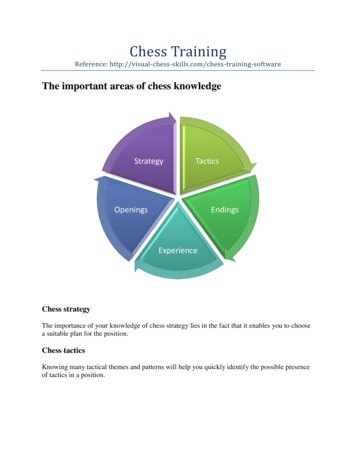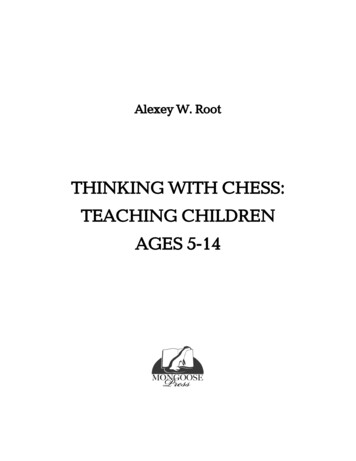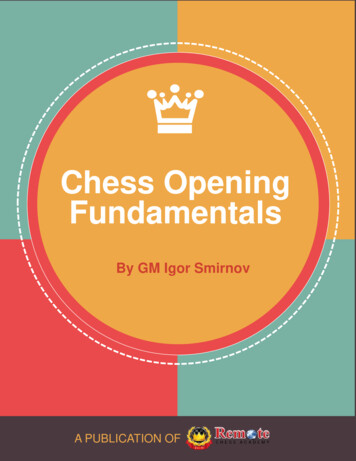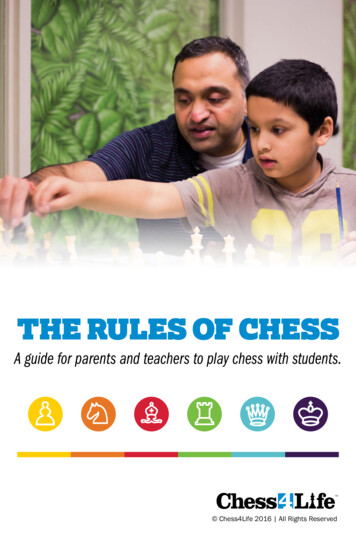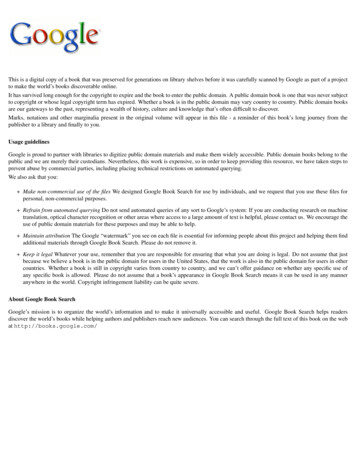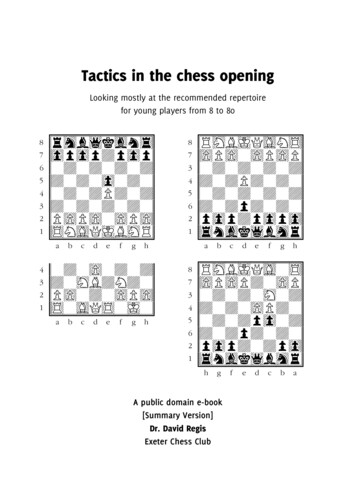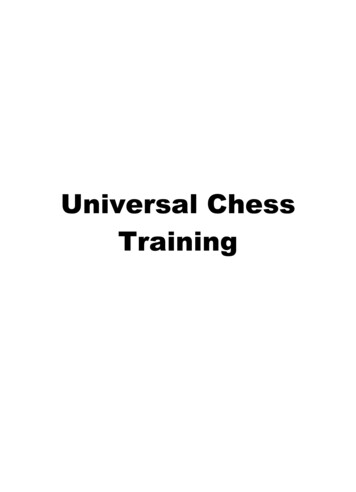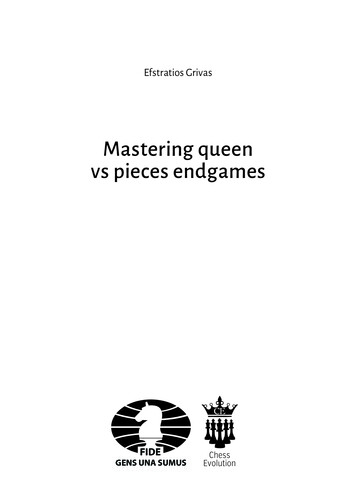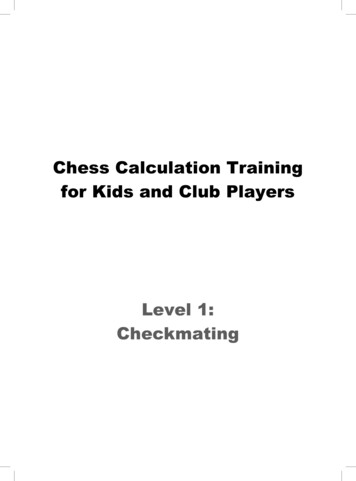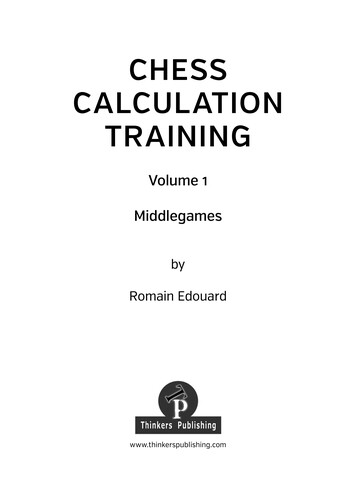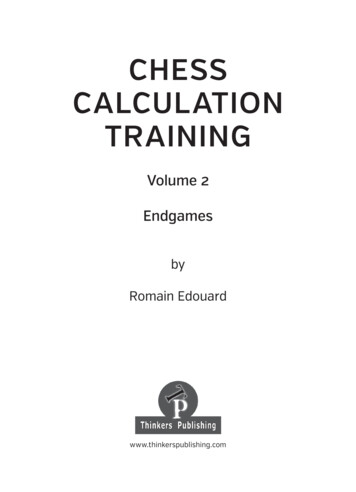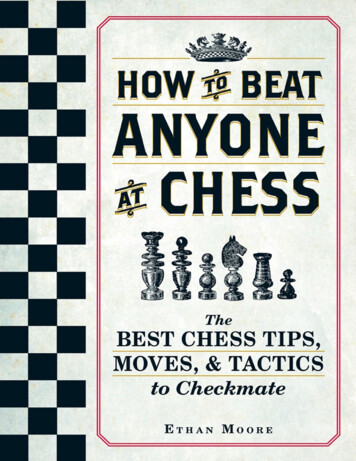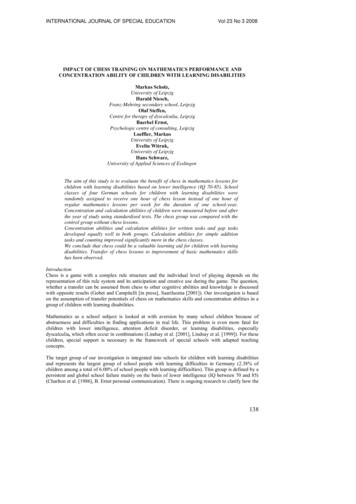
Transcription
INTERNATIONAL JOURNAL OF SPECIAL EDUCATIONVol 23 No 3 2008IMPACT OF CHESS TRAINING ON MATHEMATICS PERFORMANCE ANDCONCENTRATION ABILITY OF CHILDREN WITH LEARNING DISABILITIESMarkus Scholz,University of LeipzigHarald Niesch,Franz-Mehring secondary school, LeipzigOlaf Steffen,Centre for therapy of dyscalculia, LeipzigBaerbel Ernst,Psychologic centre of consulting, LeipzigLoeffler, MarkusUniversity of LeipzigEvelin Witruk,University of LeipzigHans Schwarz,University of Applied Sciences of EsslingenThe aim of this study is to evaluate the benefit of chess in mathematics lessons forchildren with learning disabilities based on lower intelligence (IQ 70-85). Schoolclasses of four German schools for children with learning disabilities wererandomly assigned to receive one hour of chess lesson instead of one hour ofregular mathematics lessons per week for the duration of one school-year.Concentration and calculation abilities of children were measured before and afterthe year of study using standardised tests. The chess group was compared with thecontrol group without chess lessons.Concentration abilities and calculation abilities for written tasks and gap tasksdeveloped equally well in both groups. Calculation abilities for simple additiontasks and counting improved significantly more in the chess classes.We conclude that chess could be a valuable learning aid for children with learningdisabilities. Transfer of chess lessons to improvement of basic mathematics skillshas been observed.IntroductionChess is a game with a complex rule structure and the individual level of playing depends on therepresentation of this rule system and its anticipation and creative use during the game. The question,whether a transfer can be assumed from chess to other cognitive abilities and knowledge is discussedwith opposite results (Gobet and Campitelli [in press], Saariluoma [2001]). Our investigation is basedon the assumption of transfer potentials of chess on mathematics skills and concentration abilities in agroup of children with learning disabilities.Mathematics as a school subject is looked at with aversion by many school children because ofabstractness and difficulties in finding applications in real life. This problem is even more fatal forchildren with lower intelligence, attention deficit disorder, or learning disabilities, especiallydyscalculia, which often occur in combinations (Lindsay et al. [2001], Lindsay et al. [1999]). For thesechildren, special support is necessary in the framework of special schools with adapted teachingconcepts.The target group of our investigation is integrated into schools for children with learning disabilitiesand represents the largest group of school people with learning difficulties in Germany (2.38% ofchildren among a total of 6.00% of school people with learning difficulties). This group is defined by apersistent and global school failure mainly on the basis of lower intelligence (IQ between 70 and 85)(Charlton et al. [1986], B. Ernst personal communication). There is ongoing research to clarify how the138
INTERNATIONAL JOURNAL OF SPECIAL EDUCATIONVol 23 No 3 2008approach to numbers could be facilitated for these children, how dealing with quantities and relationscould become a personal need and how the rules of abstract quantities can be visualized in real life.There is some evidence that complex games such as chess could have a positive impact on theseprocesses. In psychology chess is investigated under different paradigms. Chess is considered as amodel for cognitive processes and abilities such as perception, information management, attention,memory, logical thinking and problem solving (Gobet and Simon [1996], Grossen [1991], Horgan[1987]). These processes were measured during the game, as individual preconditions of the chessplayers and as learning effects of playing chess as well (Chase and Simon [1973], Charness [1992],Frank and D'Hondt [1979], Horgan [1987], Margulies [1991], Munzert [1993]).1.The question about special cognitive abilities of chess players is an old one. Doll and Mayr(Doll and Mayr [1987]) compared chess masters with a non-chess-playing control group and found thatin the master group there is significantly higher general intelligence, higher information processingcapacity, working speed and numerical thinking. But surprisingly, the master group did not performbetter in visuo-spacial tasks. In accordance, Frydman and Lynn (Frydman and Lynn [1992]) found thatin a sample of chess playing children (about 11 years) the general IQ (Wechsler Intelligence Scale) wassignificantly higher in comparison to the population mean, which is constituted by significantly higherperformance IQ and verbal IQs of the chess players.2.Most of psychological studies are interested in the long-term effects of chess on the players inthe sense of transfer. Chess playing can lead to different transfer effects. Transfer is defined as carryingover former learned reactions or knowledge to a new or changed situation or requirement. Transfer oflearning occurs when learning in one context or with one set of materials impacts performance inanother context or with other related materials. These transfer effects can be described on the basis ofthe following, not independent aspects:Positive transfer means an advantage for a later learning process. In this sense the effects ofchess have been investigated and the results are showing a different, partly opposite picture(Saariluoma [2001]).Negative transfer implicates a disadvantage for a later learning process in the sense ofproactive inhibition or interference. Chess was never discussed regarding this aspect.Lateral transfer describes an advantage for a later learning process on the same cognitive levelbut in other contexts. This effect is named as low road transfer by Salomon and Perkins (Salomon andPerkins [1989]) as well as Perkins and Salomon (Perkins and Salomon [1992]) and as low-level gainsby Gobet and Campitelli (Gobet and Campitelli [in press]). Low road transfer happens when stimulusconditions in the transfer context are sufficiently similar to those in a prior context of learning to triggerwell-developed semi-automatic responses. These responses are not necessarily mediated by external ormental representations. Examples are learning from specific chess positions and the transfer to similarpositions (Didierjean at al. [1999]). Here no abstraction is necessary. The improvement ofconcentration abilities through chess playing is also a lateral transfer (Gobet and Campitelli [in press]).Schneider et al. (Schneider et al. [1993]) found a very near, lateral transfer on working memory inchess playing children comparing with non-chess-playing adults for briefly presented chess positionsbut not for the recognition of digit lists. In general, stimulation of gaming by individual training orwithin groups can improve the concentration ability of children (Barchmann et al. [1991], Ortner[1991]).Vertical or hierarchical transfer means an advantage for a later learning process on a higherlevel. In chess research, this phenomenon is studied as generalisation or abstraction effect. In the modelof Perkins and Salomon (Perkins and Salomon [1992]) it is named high road transfer and depends onmindful abstraction from the context of learning or application and a deliberate search for connections:Such transfer is not automated. It requires time for exploration and the investment of mental effort.This generalisation effect has been found in several studies regarding chess. For example Marmecheand Didierjean (Marmeche and Didierjean [2001]) and Didierjean and Marmeche (Didierjean andMarmeche [2003]) showed that better chess players had a higher level of generalisation of chess rulesthan chess players with lower chess playing levels. Feldhusen (Feldhusen [1992]) showed a strongertransfer of chess to poetic analysis for students with intelligence above average in comparison tostudents with average IQ. Margulies (Margulies [1991]) reported improvement of reading skills bychess training. Gobet and Campitelli (Gobet and Campitelli [in press]) reported about so-called highlevel gains of chess in the sense of improvement of intelligence, creativity and school performance.The sequential transfer implicates a mixture of lateral and vertical transfer effects duringtraining or a lecture course. That is, during a sequence of lessons an advantage for later learningprocesses will be induced by clear principles of the time scheduling, by the stability and availability ofmental representations or schemata and by the increased process of generalisation. High level gains ofchess are based on this sequential transfer in most cases.139
INTERNATIONAL JOURNAL OF SPECIAL EDUCATIONVol 23 No 3 2008A specific transfer is based on similarities in both demands. The advantage in the second taskcan be explained by using the experience obtained in the first task. For chess novices, learning fromexamples as a case-based transfer is described by Didierjean et al. (Didierjean and Marmeche [1999]).An unspecific transfer implicates an advantage for a different domain with no similaritiesbetween both tasks. Gobet and Campitelli (Gobet and Campitelli [in press]) reported about theseunspecific transfer effects of chess on learning to lose, learning that improvement comes with learningand on the interest on school in underprivileged environments. Furthermore, chess may motivatechildren for independent activities and occupation with books and computers (Vail [1995]).The explanation of the different aspects and kinds of transfer is based on the theory of identicalelements in both performances (Thorndike and Woodworth [1901]), the theory of formal education, thetheory of generalisation (Judd [1908]) and the transposition concept.Positive findings of different kinds of transfer suggest that it is a question regarding the conditions ofworking or learning whether transfer occurs or not. One needs to ask under what conditions transferappears. Positive conditions of transfer are described by Perkins and Salomon (Perkins and Salomon[1992]) in five main aspects of working conditions, which can be stimulated by teachers, parents,partners or trainers. These five aspects involve: Thorough and diverse practice, explicit abstraction,active self-monitoring, arousing mindfulness and using metaphor or analogy.On the other hand, most of the findings summarized above are based on studies with selected childrenof normal or higher intelligence or even chess masters. Transfer studies with children of lowerintelligence or learning disabilities or on the basis of mandatory teaching of chess in school classeshave not yet been performed to a larger extent but there is ongoing research (e.g. Hong and Bart[2007], Pogrow [1988], Storey [2000]). Based on empirical experiences with chess teaching inmathematics lessons collected in one school for children with learning disabilities (Niesch and Schwarz[2004]), we started a study in four such schools in the city of Leipzig, Germany, and its surroundingarea.In our study we asked for relatively specific, positive, sequential and low road transfer of chess in thespecial group of children with learning disabilities to two domains. Firstly, chess playing needs a highlevel of attention. Over a chess training of one year we expected a transfer to higher concentrationability. Secondly, at the same time, we expected a positive transfer to basic mathematical skills of thechildren such as counting and addition of numbers with one to two digits. The latter one is assumedbecause of several direct mathematical aspects within chess such as elements of geometry e.g. bydealing with distances and metrics, set theory e.g. by abstraction of different pieces which belong toone group and counting with fields and pieces (Gik [1986], Soltis [1994]). Therefore, we performedstandardized concentration tests and test of basic calculation abilities before and after the year of thestudy to quantify the effect of chess lessons for the improvement of concentration and calculationabilities of the children, and compared the results with a control group without chess lessons. Anotheraim of this study was to evaluate the feasibility of chess lessons in our schools, which includes thepracticability of developed chess-teaching material, also for non-chess-playing teachers and the chessplaying abilities of children after one school year of practising.MethodParticipantsThe schools for children with learning disabilities included into this study are a part of the generaleducating school system in Saxony, Germany for children with learning disabilities. Children visit thisschool from the beginning, or switch to it later because of a persistent and global school failure mainlyon the basis of lower intelligence (range of IQ 70 to 85, Charlton et al. [1986], B. Ernst personalcommunication).School classes are much smaller than in regular schools (8 to 13 children), and teaching methods arespecialized for the difficulties faced. The study was initiated in seven classes of four such schools inLeipzig and its surrounding area with third and forth graders (two classes in each school except for onewith only one class) in the autumn of 2004. School authorities and parents of children were informedand gave consent to the study.Study designThe study duration was one school year. In the schools with two classes, one of the classes had beenselected randomly and received one hour of chess lessons instead of one hour of regular mathematics140
INTERNATIONAL JOURNAL OF SPECIAL EDUCATIONVol 23 No 3 2008lessons per week. In the following, we denote this group as the experimental group. The other classescontinued to receive the planned five regular lessons of mathematics per week so that it can beconsidered as a control group. In the school with only one class, the class also received chess lessons.Concentration and calculation abilities of children were measured in th
Concentration and calculation abilities of children were measured before and after the year of study using standardised tests. The chess group was compared with the control group without chess lessons. Concentration abilities and calculation abilities for written tasks and gap tasks developed equally well in both groups. Calculation abilities for simple addition tasks and counting improved .
